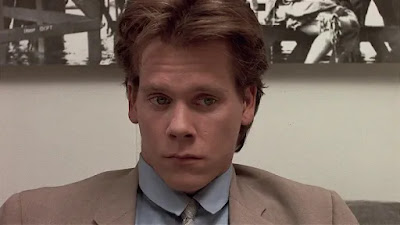The Big Picture (Christopher Guest, 1989) Every film-maker who has ever made a film in Hollywood has had a sneaking desire to make a film about the absurdities of making a film in Hollywood. There's just a considerable smaller amount who have the balls to risk reprisals in the company-town. One doesn't shit where one eats. There's an even smaller amount who have the talent, wit, and lack of invective to point out the absurdities without making it a hatchet job...or a crashing bore.
Wilder. Keaton. Sturges (Preston). Kelly and Donen. Cukor (and Wellman). Kazan. Minnelli. Rush. Altman. The Coen's. Welles. That's a considerable list and the results have every color of attitude from wonder-blushing red to ultra-purple put-down.
Chris Guest's 1989 film falls somewhere in-between, retaining the wonder-lust of film-making with the soul-crushing corporate low-balling of vision. Having the creative impulse doused by a flood of compromises and bidding agendas.Budding film-maker Nick Chapman (Kevin Bacon) is "hot", having just won a film-making competition and given the opportunity to pitch ideas for "projects." Taking a meeting with studio producer Alan Habel (J.T. Walsh) gives him flashing hope until Habel wants to make changes to his ideas more in line with Habel's peccadilloes. Then, there's the "Catch-22" of not having an agent—he can't be taken seriously without one but can't get one until he's taken seriously. So, he takes a lunch with a prospective agent (Martin Short), more interested in being seen than seeing what he can do.
Then, he gets invited to a Hollywood party given by Habel and his wife (Fran Drescher), but it's less about working than distraction—touring the house, socializing, networking. One of the biggest distractions is Gretchen (Teri Hatcher, her first film), aspiring actress, who further pushes Nick from his artistic visions by suggesting that he write his movie with her in mind. Her efforts further complicate Nick's life by making his girlfriend Susan (Emily Longstreth) jealous, driving a wedge in their relationship. Gretchen becomes the embodiment of every Hollywood enticement, moving him further from making HIS movie and compromising his aspirations. Pretty soon, his potential movie is so far afield from his intentions that his enthusiasm starts to wane, and ultimately, his film is canceled, forcing him to take entry-level jobs in Hollywood just to make ends meet.Oh, how far the lofty intentions fall. It's hard to drum up much sympathy for Nick—sure, the Hollywood system is corrupt and capricious, but Guest at least makes his downfall as much about the weakness of Nick's character as the environment he's stepped into.
That story, thus, is not that involving, and it has a hard time competing with the opening of the showing of student films vying for Best of Show, which is a hilarious look at the pit-falls of student film competitions; they involve a film by an agent's son—loaded with recognizable stars, but clearly shot at a time when those actors are available, with mismatched shots showing that nobody was on the same set at the same time—or a full-of-itself vanity project by a young filmmaker with an outsized ego featuring himself in a starring role. The satire of the sequence is sharp and cruel and the rest of the film never lives up to the potential of the opening sequence—an inadvertent portent for what is to come for its hero.





No comments:
Post a Comment